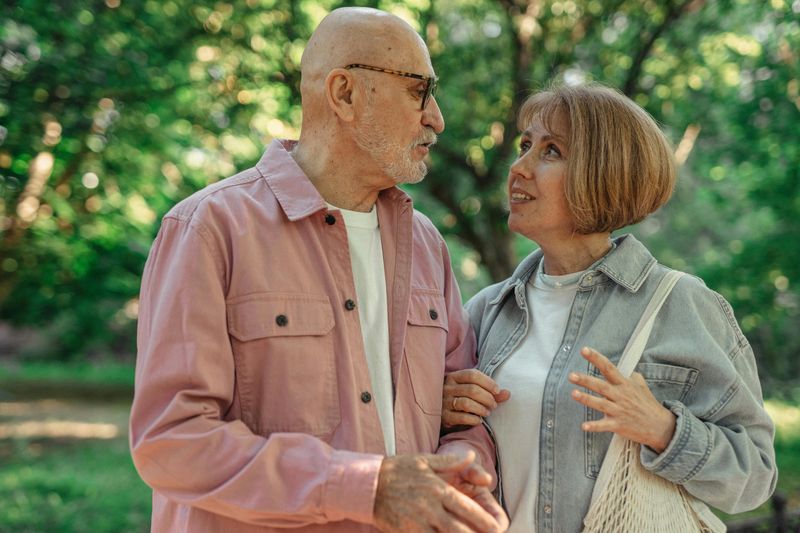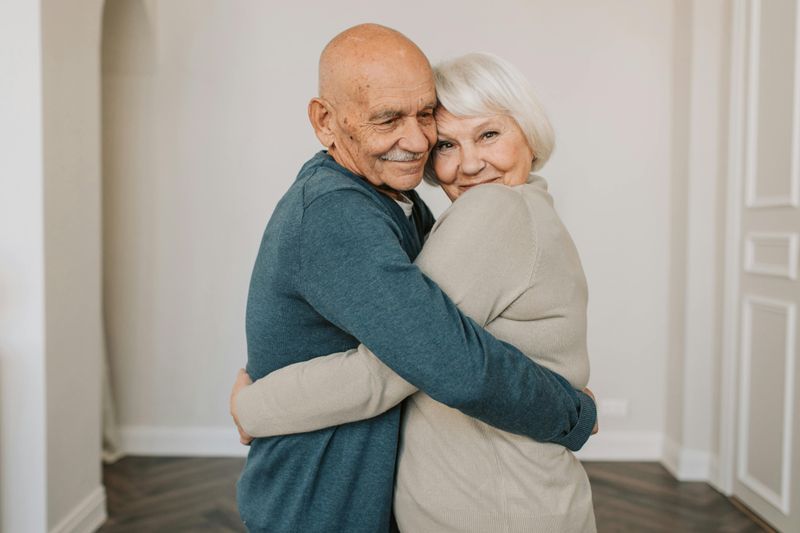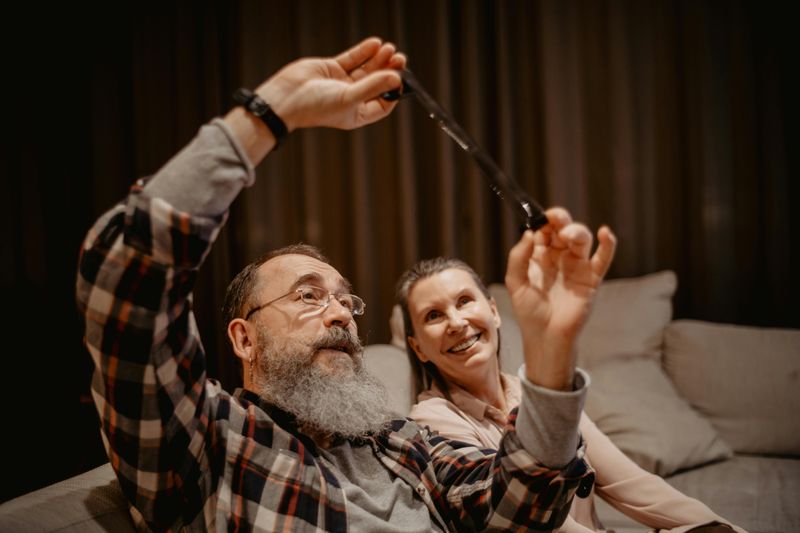After decades of life experience, women over 50 have gained valuable wisdom about what truly matters in relationships. They’ve weathered enough storms to know exactly what works and what doesn’t. These seasoned women have developed clear boundaries and expectations that help create healthier, more fulfilling partnerships. Let’s explore the relationship habits that women in their golden years consider absolutely essential.
1. Respect Above All Else
Mutual respect forms the bedrock of any lasting relationship. Women who’ve lived half a century recognize that without it, love simply cannot flourish.
Being valued for your opinions, boundaries, and personhood isn’t just nice—it’s necessary. When disagreements arise, respectful communication prevents the kind of damage that can’t be undone with flowers or apologies.
Many women share that they’ve learned to walk away at the first sign of disrespect, whether it’s interrupting, dismissive language, or belittling behaviors. Life’s too short to waste on someone who doesn’t honor your worth.
2. Financial Transparency
Gone are the days of financial naivety. Women over 50 demand complete honesty about money matters, having witnessed how financial secrets can devastate relationships.
Regular conversations about spending habits, savings goals, and retirement plans aren’t just practical—they’re essential for building trust. Many have learned this lesson the hard way, discovering hidden debts or spending habits only after significant damage was done.
Separate accounts might be fine, but separate financial lives aren’t. Sharing credit reports before serious commitment has become standard practice for women who understand that financial compatibility matters just as much as emotional connection.
3. Personal Space Is Sacred
“I need my breathing room” has become a relationship mantra for women who’ve spent decades discovering their authentic selves. Having separate interests, friends, and occasional solo adventures isn’t just allowed—it’s encouraged.
A partner who respects your need for independence shows true security in the relationship. Many women share that their previous relationships suffered from suffocation, with partners who mistook togetherness for attachment.
The freedom to enjoy a weekend with girlfriends, pursue a hobby alone, or simply have uninterrupted reading time has become non-negotiable. Healthy relationships thrive on interdependence rather than codependence.
4. Equal Household Responsibilities
The days of women shouldering all domestic duties are firmly in the rearview mirror. Seasoned women report that equal partnership in home management is absolutely essential for relationship harmony.
Nobody wants to be a maid to their partner. Cooking, cleaning, laundry, and household management should be shared responsibilities, regardless of who works more outside the home.
Women who’ve previously managed both career and home single-handedly recognize the resentment that builds from imbalance. Many now establish clear expectations about shared duties from day one, understanding that how partners handle household work reflects deeper attitudes about equality.
5. Meaningful Conversations Beyond Small Talk
Small talk might sustain casual friendships, but intimate relationships require deeper connection. Women with decades of life experience crave partners who can discuss everything from philosophy to politics with depth and nuance.
The ability to express feelings, fears, and dreams creates true intimacy. Many women report that previous relationships faltered when conversations never ventured beyond daily logistics or surface-level pleasantries.
A partner who asks thoughtful questions and listens without immediately trying to solve problems shows emotional intelligence. The quality of conversation often predicts the quality of connection, which is why the capacity for meaningful dialogue has become non-negotiable.
6. Appreciation Expressed Regularly
Taking each other for granted is relationship poison, according to women who’ve weathered multiple decades. Partners who notice efforts and express genuine gratitude create an atmosphere of warmth and recognition.
Small acknowledgments matter tremendously. A sincere “thank you” for making dinner, handling errands, or simply being supportive during a tough day reinforces that your contributions are seen and valued.
Many women share that previous relationships crumbled under the weight of feeling invisible or underappreciated. The habit of actively looking for things to appreciate about your partner—and expressing that appreciation out loud—has become essential for relationship longevity.
7. Honesty Without Cruelty
Truth-telling is non-negotiable, but delivery matters tremendously. Women over 50 have learned that honesty without compassion is simply brutality in disguise.
Partners who can share difficult truths with kindness demonstrate emotional maturity. Whether discussing relationship concerns, physical changes, or life disappointments, the capacity to be truthful while considering your partner’s feelings shows profound respect.
Many women report that previous relationships featured either harmful lies or brutal honesty that left emotional scars. The middle path—truthfulness wrapped in kindness—has become essential. As one woman put it: “I need the truth, but I deserve to receive it with love.”
8. Maintaining Physical Intimacy
Contrary to outdated stereotypes, women over 50 consider physical connection vital to relationship health. The form may evolve over time, but the importance of touch, affection, and intimacy doesn’t diminish with age.
Regular physical connection—whether through passionate intimacy, gentle caresses, or simply holding hands while walking—creates essential bonding. Many women emphasize that intimacy needs change throughout life, requiring partners who can communicate openly about desires and adaptations.
Physical affection outside the bedroom matters tremendously too. A partner who offers spontaneous hugs, back rubs, or casual touches throughout the day helps maintain the physical connection that distinguishes romantic relationships from friendships.
9. Embracing Each Other’s Growth
People continue evolving throughout life—a truth that women over 50 deeply understand. Partners who encourage personal development rather than resisting change demonstrate true love.
Taking a new class, changing careers, developing different opinions, or discovering new passions shouldn’t threaten a solid relationship. Many women report that previous partnerships faltered when their personal growth was perceived as threatening rather than celebrated.
The capacity to cheer each other on through transformations big and small has become essential. As one woman beautifully expressed: “I need someone who loves who I am today but is equally excited about who I might become tomorrow.”
10. Laughter As Life Medicine
Humor creates resilience in relationships that face inevitable challenges. Women who’ve navigated life’s ups and downs recognize that partners who can laugh together stay together longer.
Sharing inside jokes, finding humor in difficult situations, and not taking yourselves too seriously creates powerful bonds. Many women emphasize that previous relationships became unbearably heavy without the lightness that laughter brings.
A partner with whom you can be silly, playful, and authentically joyful becomes increasingly valuable with age. The capacity for shared humor doesn’t just make relationships more enjoyable—it helps couples weather life’s inevitable storms with greater grace.
11. Unwavering Support During Health Challenges
Bodies change, health fluctuates, and medical challenges arise with age. Women over 50 need partners who remain steady through physical transformations and health concerns.
True commitment means showing up for doctor’s appointments, researching conditions together, and providing emotional support during recovery periods. Many women share stories of relationships that failed when health challenges revealed a partner’s limited capacity for caregiving or empathy.
“In sickness and in health” becomes less abstract and more concrete as decades pass. Partners who respond to health changes with compassion rather than complaint or withdrawal demonstrate the depth of their commitment to the relationship rather than just its convenient aspects.











